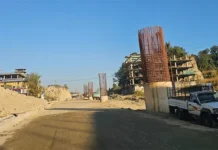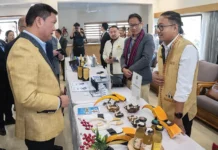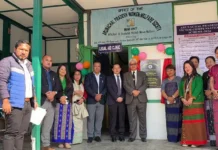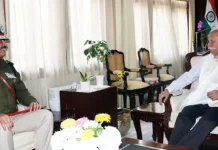[ Litem Eshi Ori ]
“A good teacher is like a candle – it consumes itself to light the way for others.” – Mustafa Kemal Ataturk
We’ve all had teachers who have inspired us and made a difference to our lives. Teachers have the power to make or break lives. A great lesson can inspire a passion for a subject that lasts a lifetime, while lacklustre teaching can kill any desire for learning. Teachers who make a significant difference in their students’ lives – sometimes against all odds – deserve to be celebrated.
Jongge Yirang (56), former deputy director of school education (DDSE) of East Siang district, joined office on 17 August, 2016 as a DDSE, and changed the picture of the schools in the district. East Siang district stands third in the literacy rate as per the 2011 census, but many challenges were ahead of him and many more changes were to be done in the education department of the district. During his tenure as the DDSE for four-and-a-half years, he carried out various activities for the district and won the heart of the region. Yirang believed in motivating teachers and winning their confidence, rather than giving orders and commands. He always encouraged the teaching community to be dedicated and selfless.
Within one year he won the confidence and respect of all categories of staff, including the officers and public of East Siang. After assuming charge as the DDSE of the district, he found that some school buildings were in a dilapidated condition. He initiated a ‘voluntary school renovation’ programme in the district, wherein six schools – the government upper primary schools in Ngopok, Silluk, Ayeng, Borguli and Mirem, and the government secondary school in Balek – were voluntarily renovated with the help of well-wishers, alumni, etc, without taking any assistance from the government. Addition of classrooms, repainting, and construction of the schools’ walls were also done. No other thing in life provides children with an opportunity to develop positive character traits and to soak up many quality values as sports do. So, to ensure the students’ active participation in sports, he introduced games and sports in the UPS level, which was sponsored by the local MLAs through their MLALAD funds, for which he personally approached the local MLAs and convinced them. As the concept of learning by doing is a very effective tool in imparting life skills and understanding of the environment, he introduced kitchen gardens in the schools’ premises, with the help of the teachers and students, to grow green leafy vegetables.
Another unique thing he introduced was inviting retired officers and state awardee teachers as chief guests during the Teachers’ Day celebration, and inviting Class 10 toppers of the district as guests of honour. During Teachers’ Day celebration, to encourage the teachers, mementoes were given to the state awardee teachers in recognition of their outstanding performance. Besides this, the best schools of the district and the best teachers (category-wise and block-wise) were awarded during the celebration. These awards were the basis for recommendation for the state award and the CM’s best teachers’ awards. One unique contribution was a centralized kitchen shed (MDM) under the decentralized district innovation fund, where 21 cluster schools were covered under the centralized kitchen programme. One more unique introduction was the conducting of the annual exams of
Classes 3, 4, 6 and 7 as a complex examination under the respective principal clusters. However, the question papers, report cards and answer scripts are centrally-sponsored by the district office.
After shifting the DDSE office to a new building in the southern part of Pasighat town, it was found that there was no electrification, which hampered the office’s day-to-day activities. Seeing this condition, he approached the MLAs and the power department and finally got it well-electrified.
Speaking to this reporter, Yirang said, “Limited funds and time will never be an excuse if you earn the trust of the people and take them with you on the path of development. Our villages lack basic facilities, and the children still depend on government schools because they cannot afford private schools. It is only when we empower them with good infrastructure and educational institutions that tomorrow a young boy/girl in a remote village in India will dream of joining the civil services. We have to change the archaic ways and build a people-friendly administration.”






